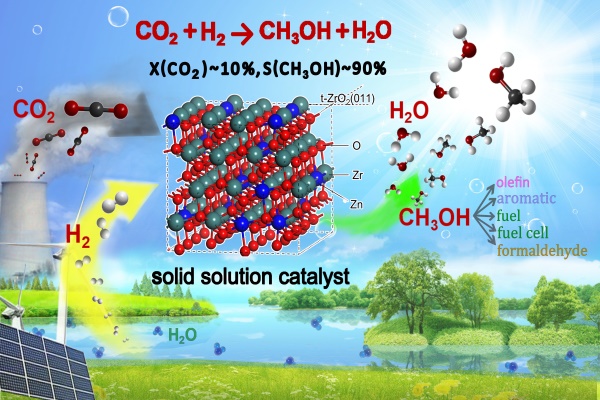“A highly selective and stable ZnO-ZrO2 solid solution catalyst for CO2 hydrogenation to methanol” was published as a research article in Science Advances by Can Li’s group, coauthored with Jijie Wang, Guanna Li, Zelong Li, Chizhou Tang, Zhaochi Feng, Hongyu An, Hailong Liu and Taifeng Liu (DOI: 10.1126/sciadv.1701290).
Global environmental changes caused by CO2 emissions have become a worldwide concern. Catalytic hydrogenation of CO2 to methanol utilizing the hydrogen from renewable energy sources has received much attention. Prof. Can Li’s groups pay much attention on converting CO2 as a carbon resource to chemicals utilizing renewable energy. The development of highly selective catalyst is one of the most difficult steps for achieving the selective hydrogenation of CO2 to methanol.
Prof. Can Li’s group developed a ZnO-ZrO2 solid solution catalyst, which can achieve methanol selectivity up to 86%~91% with CO2 single-pass conversion over 10%. Experimental and theoretical results indicate that the synergetic effect between Zn and Zr sites, for H2 and CO2 activation, respectively, resulting in the excellent performance. IR-MS isotopic experiments and DFT calculations reveal that the surface HCOO* and H3CO* species are the possible intermediates for CO2 hydrogenation to methanol. The ZnO-ZrO2 solid solution catalyst shows high stability in at least 500 h on stream, and is also resistant to sintering at higher temperatures. Moreover, no deactivation is observed in the presence of 50 ppm SO2 or H2S in the reaction stream. These features make the catalyst promising for industrial application.
This work was supported by Strategic Priority Research Program of the Chinese Academy of Sciences (Grant No. XDB17020200), National Natural Science Foundation of China (NSFC Grant No. 21621063).

By Jijie Wang